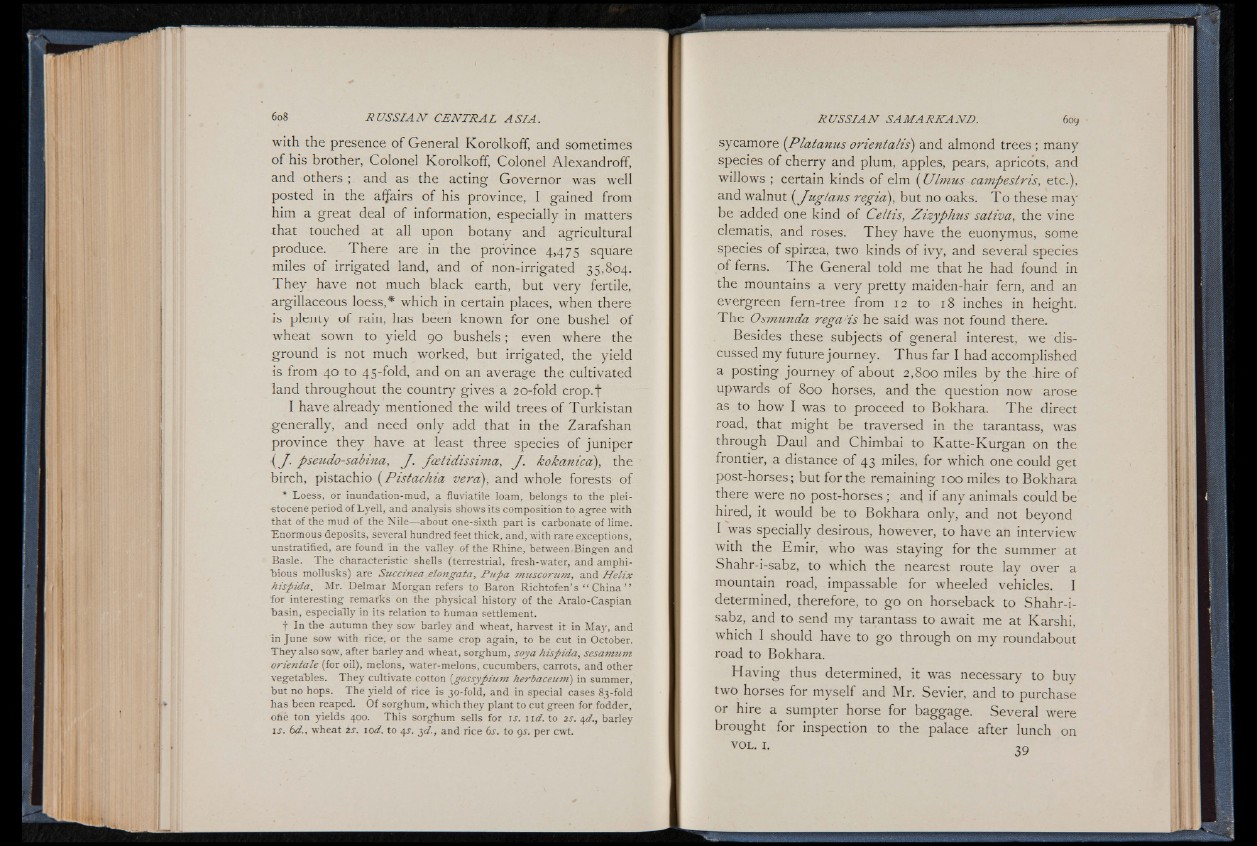
with the presence of General Korolkoff, and sometimes
of his brother, Colonel Korolkoff, Colonel Alexandroff,
and others ; and as the acting Governor was well
posted in the affairs of his province, I gained from
him a great deal of information, especially in matters
that touched at all upon botany and agricultural
produce. There are in the province 4,475 square
miles of irrigated land, and of non-irrigated 35,804.
They have not much black earth, but very fertile,
argillaceous loess,* which in certain places, when there
is plenty of rain, has been known for one bushel of
wheat sown to yield 90 bushels; even where the
ground is not much worked, but irrigated, the yield
is from 40 to 45-fold, and on an average the cultivated
land throughout the country gives a 20-fold crop.f
I have already mentioned the wild trees of Turkistan
generally, and need only add that in the Zarafshan
province they have at least three species of juniper
</. pseudo-sabina, J . fcetidissima, J . kokanicd), the
birch, pistachio {Pistachio, verci), and whole forests of
* Loess, or inundation-mud, a fluviatile loam, belongs to the pleistocene
period of Lyell, and analysis shows its composition to agree with
that of the mud of the Nile— about one-sixth part is carbonate of lime.
Enormous deposits, several hundred feet thick, and, with rare exceptions,
unstratified, are found in the valley, of the Rhine, between,Bingen and
Basle. The characteristic shells (terrestrial, fresh-water, and amphibious
mollusks) are Succinea elongata, Pupa muscorum, and Helix
hispida. Mr. Delmar Morgan refers to Baron Richtofen’ s “ China ”
for interesting remarks on the physical history of the Aralo-Caspian
basin, especially in its relation to human settlement.
t In the autumn they sow barley and wheat, harvest it in May, and
in June sow with rice; or the same crop again, to be cut in October.
They also saw, after barley and wheat, sorghum, soya hispida, sesamum
orientale (for oil), melons, water-melons, cucumbers, carrots, and other
vegetables. They cultivate cotton (gossypium herbaceum) in summer,
but no hops. The yield of rice is 30-fold, and in special cases 83-fold
has been reaped. Of sorghum, which they plant to cut green for fodder,
one ton yields 400. This sorghum sells for is. 1 id. to 2s. 4d., barley
is. 6d.. wheat 2s. 10d. to 4J. jd ., and rice 6s. to 9s. per cwt.
sycamore {Platanus orientalis) and almond trees ; many
species of cherry and plum, apples, pears, apricots, and
willows ; certain kinds of elm {Ulmus campestris, etc.),
and walnut {Jugtans regia), but no oaks. T o these may
be added one kind of Celtis, Zizyphus sativa, the vine
clematis, and roses. They have the euonymus, some
species of spiraea, two kinds of ivy, and several species
of ferns. The General told me that he had found in
the mountains a very pretty maiden-hair fern, and an
evergreen fern-tree from 12 to 18 inches in height.
The Osmunda rega!is he said was not found there.
Besides these subjects of general interest, we discussed
my future journey. Thus far I had accomplished
a posting journey of about 2,800 miles by the hire of
upwards of 800 horses, and the question now arose
as to how I was to proceed to Bokhara. The direct
road, that might be traversed in the tarantass, was
through Daul and Chimbai to Katte-Kurgan on the
frontier, a distance of 43 miles, for which one could get
post-horses; but for the remaining 100 miles to Bokhara
there were no post-horses; an4 if any animals could be
hired, it would be to Bokhara only, and not beyond
I was specially desirous, however, to have an interview
with the Emir, who was staying for the summer at
Shahr-i-sabz, to which the nearest route lay over a
mountain road, impassable for wheeled vehicles. I
determined, therefore, to go on horseback to Shahr-i-
sabz, and to send my tarantass to await me at Karshi,
which I should have to go through on my roundabout
road to Bokhara.
Having thus determined, it was necessary to buy
two horses for myself and Mr. Sevier, and to purchase
or hire a sumpter horse for baggage. Several were
brought for inspection to the palace after lunch on
VOL. X.